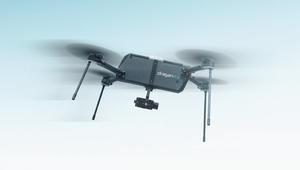At Whitman’s Slimmer HPE, Acquisitions Offer Promise of GrowthAt Whitman’s Slimmer HPE, Acquisitions Offer Promise of Growth
Meg Whitman has taken steps to shrink Hewlett Packard Enterprise into a company that’s less than half the size of the Silicon Valley behemoth it once was. Whitman now is signaling that she’s inclined to add back some heft through acquisitions.
November 23, 2016

After breaking off HPE from its PC and printer businesses last year, Chief Executive Officer Whitman has sought to make the corporate technology provider even slimmer by cutting deals to spin off other units that are dragging on growth. But the company still needs new ways to thwart competition from cloud-computing giants such as Amazon.com Inc. and Google. These rivals have eroded demand for HPE’s servers, software and storage gear by offering the same products and services on a pay-as-you-go basis — giving corporate customers less incentive to buy the pricey hardware traditionally used to handle such tasks.
To jump-start growth, Whitman could soon start to acquire smaller companies in areas such as storage and networking, analysts say. Even as some businesses are opting to buy outsourced cloud services from rivals, there are many companies that still want to build out their own data centers, HPE says. Looking to fill out its product lineup with more modern offerings, HPE recently considered storage company Simplivity as a potential target, according to people familiar with the matter. HPE could also consider other startups or public companies, such as Pure Storage Inc. or Barracuda Networks Inc., analysts say.
“I think significant organic growth going forward will be nonexistent due to the competition from the public cloud providers,” said Tim Feeney, an analyst at Morningstar Inc. “Whitman may look to M&A to augment organic growth.”
Related: The 50 Most Influential Women in IoT
HPE declined to comment on any acquisition targets. A Pure Storage spokeswoman had no immediate comment, and a Barracuda representative didn’t immediately respond to a request for comment. Simplivity CEO Doron Kempel declined to comment and said the company is focused on building its business.
Cloud Threat
Hewlett Packard Enterprise on Tuesday will report fiscal fourth-quarter earnings. Analysts on average project profit, excluding certain items, of 60 cents a share, which would be the best quarter since the split from HP Inc. on Nov. 1 of last year. HPE is forecast to report revenue of $12.84 billion, according to data compiled by Bloomberg. The stock has gained about 52 percent so far this year.
Amazon, Microsoft and Alphabet Inc.’s Google are the leading purveyors of what’s known as the public cloud, selling access to off-site data centers that handle all manner of computing tasks; these companies pose the biggest risks to HPE and its rivals, such as Dell Technologies and Lenovo, whose revenue still depends on demand for hardware, software or services. The public cloud market is expected to more than double in size from 2015 to 2018, according to Gartner Inc., as customers choose the option that lets them order up more computing power, complete with storage and networking, without the hassle and expense of equipping their own data centers with gear from companies like HPE.
Palo Alto, California-based HPE has responded to the impact on demand for its own products by casting off pieces of the business that have curbed profitability or lacked growth prospects. In May, HPE said it would spin off its service business, and in September the company said it would free itself from some software assets. The spinoffs should provide about $4 billion in cash, adding to the roughly $11 billion the company had at the end of the third quarter.
“I would argue they need more innovation,” said Jayson Noland, an analyst at Robert W. Baird & Co. “There’s a lot of change taking place in infrastructure with public cloud — and they need to capitalize on that. And that innovation is probably going to come through M&A.”
The company has a difficult history with acquisitions. Some of the businesses being spun off were originally brought aboard in past deals that were touted as growth drivers prior to Whitman’s arrival. That includes services company EDS, which cost about $13 billion in 2008, and software maker Autonomy, bought for roughly $10 billion in 2011, according to data compiled by Bloomberg.
Disciplined Deals?
For her part, Whitman remains open to acquisitions, though she’s shown more prudence than her predecessors. She has cited past Hewlett-Packard deals including Aruba Networks, which cost about $2.5 billion, and 3PAR, which cost a similar amount, as potentially good examples of what HPE needs to do going forward.
“As companies come along, we will certainly evaluate them,” Whitman said at an analysts’ meeting in October. “And what I would just say is, returns-based discipline appropriately priced. And what we’re not interested in is a very big acquisition that is potentially negative margin.”
The company has already shown some appetite for deals. It recently purchased Silicon Graphics, whose hardware and software aid customers with computing, data analytics and data management, for about $250 million.
Whitman could start to look for deals that are larger — and in other markets that have shown promise, including storage, security and networking, analysts say, to quickly take advantage of growth opportunities that aren’t strictly tied to the public cloud. If HPE pursues a deal With Simplivity, the price tag could be higher than it was for Silicon Graphics. The startup was valued at more than $1 billion last year.
“Simplivity would be a very good fit for HPE,” Crawford Del Prete, an analyst at IDC, said in an e-mail. “It would add interesting data-management capabilities to HPE’s portfolio.”
There are other options in storage. They include Pure Storage, which has a market capitalization of about $2.9 billion, and Nimble Storage, valued at about $780 million, according to Feeney.
The company also could bulk up its chops in networking or security. That could mean a deal for a business like Barracuda Networks, with a market value of about $1.3 billion, according to Noland.
Whitman also sees opportunities in emerging businesses, such as what’s called the hybrid cloud, where customers buy access to the public cloud and gear from the likes of HPE for their own data centers. She has also touted growth possibilities in providing gear for a market called the “edge” — the hardware required at various locations to handle data being created by the Internet of Things, or connected devices from cars to oil rigs.
Whatever business it targets, investors may have to brace for more acquisition activity than some would prefer, analysts at Barclays said after listening to executives at a conference last month. The pressures on the company may lead HPE to make bigger bets, the analysts said. Though the company has kept key pieces of its services and software for customers, it will have to keep moving forward into new markets.
“We are concerned that HPE’s core assets will not be able to fully counter the increasing migration to the cloud by customers without bolstering its M&A in a bigger way,” they wrote in a note. “In other words, the pace of cloud adoption stands to happen at a faster rate in coming years, thus requiring larger M&A contribution to preserve a semblance of sustainable revenue growth.”
About the Author
You May Also Like
.jpg?width=700&auto=webp&quality=80&disable=upscale)
.jpg?width=700&auto=webp&quality=80&disable=upscale)

.jpg?width=300&auto=webp&quality=80&disable=upscale)


